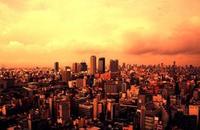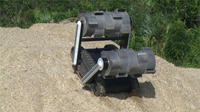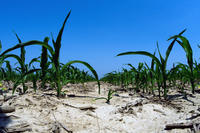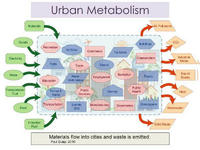-
Novel nanosized antenna arrays key to effective harvesting of solar energy
For years, scientists have studied the potential benefits of a new branch of solar energy technology that relies on incredibly small nanosized antenna arrays that are theoretically capable of harvesting more than 70 percent of the sun’s electromagnetic radiation and simultaneously converting it into usable electric power. A novel fabrication technique could provide the breakthrough technology scientists have been looking for to improve today’s solar energy systems.
-
-
Wastewater from fracking is often highly radioactive
New studies have found that waste from fracking operations can be highly radioactive. A geological survey reported that millions of barrels of wastewater from unconventional wells in Pennsylvania and conventional wells in New York are 3,609 times more radioactive than the federal limit for drinking water, and 300 times more radioactive than a Nuclear Regulatory Commission limit for nuclear plant discharges.
-
-
Climate change threatens public health, safety, economy along U.S. coasts
A new technical study from the U.S. National Oceanic and Atmospheric Agency (NOAA) and the U.S. Geological Survey (USGS) reports that the effects of climate change will continue to threaten the health and vitality of U.S. coastal communities’ social, economic, and natural systems. All U.S. coasts are highly vulnerable to the effects of climate change such as sea-level rise, erosion, storms, and flooding, especially in the more populated low-lying parts of the U.S. coast along the Gulf of Mexico, Mid-Atlantic, northern Alaska, Hawaii, and island territories. The report says that the financial risks associated with both private and public hazard insurance are expected to increase dramatically.
-
-
Osaka Basin quake map identifies high-rise buildings at risk

The Osaka Basin, Japan is home to many high-rise buildings which sit atop its thick soft sediments, vulnerable to long-period strong ground motions that last minutes. A new map created by Japanese researchers is intends to guide engineers and city planners in new construction and identifies existing buildings with the potential of resonance vibration.
-
-
New bridge construction technologies to shore up U.S. infrastructure
Experts agree that there is an urgent need to construct and repair bridges across the United States. Around 70,000 bridges in the country are considered “structurally deficient” by government standards. New technology could help the United States manage its growing, and aging, infrastructure without breaking the bank or levying high taxes on citizens.
-
-
NASA engineers building sturdy blue-collar mining robot

After decades of designing and operating robots full of scientific gear to study other worlds, NASA is working on a prototype that leaves the delicate instruments at home in exchange for a sturdy pair of diggers and the reliability and strength to work all day, every day for years.
-
-
Extreme rainfall linked to global warming
A worldwide review of global rainfall data has found that the intensity of the most extreme rainfall events is increasing across the globe as temperatures rise. In the most comprehensive review of changes to extreme rainfall ever undertaken, researchers evaluated the association between extreme rainfall and atmospheric temperatures at more than 8,000 weather gauging stations around the world.
-
-
Pentagon to bolster U.S cyberwar capabilities
The Department of Defense is planning an expansion of the U.S. Cyber Command, and the Pentagon plans on recruiting thousands of code crackers, online security professionals, and hackers in order to assemble the nation’s largest cyber army ever.
-
-
The historical probability of drought

Droughts can severely limit crop growth, causing yearly losses of around $8 billion in the United States. It may be possible, however, to minimize those losses if farmers can synchronize the growth of crops with periods of time when drought is less likely to occur. Researchers are working to create a reliable “calendar” of seasonal drought patterns that could help farmers optimize crop production by avoiding days prone to drought.
-
-
Projected U.S. water use to increase as climate warms
Despite increases in efficiency, water demand in the United States is likely to increase substantially in the future if climate continues to warm, new projections indicate.
-
-
Maryland counties debate funding stormwater drainage management
A new tax aimed at property owners could finance the first set of improvements of the drainage works in Salisbury, Maryland since the original system was laid almost a century ago. City leaders have been arguing since 2009 over dedicating a source of funding to stormwater management, when an environmental panel recommended it. In the past, funding for projects like this has been hard to find as other priorities were deemed more important.
-
-
Using silicon to produce hydrogen on demand
Super-small particles of silicon react with water to produce hydrogen almost instantaneously, according to researchers. In a series of experiments, the scientists created spherical silicon particles about ten nanometers in diameter. When combined with water, these particles reacted to form silicic acid (a nontoxic byproduct) and hydrogen — a potential source of energy for fuel cells.
-
-
Part Three: Bechtel and the Y-12 security breach
With an annual security budget of $150 million, the Y-12 Nuclear Complex at Oakridge, Tennessee, prided itself on its high-tech security system built to protect more than 179 tons of uranium. After Sister Megan Rice, age 82, and two confederates, both senior citizens, too — the three were armed with nothing but wire cutters and flashlights — broke into the Y-12 facility on 28 July 2012, one security guard was fired. Numerous investigations and reports, however, show that last July’s incident was but one in a series of security failures and breaches at nuclear sites under the supervision of the National Nuclear Security Administration (NNSA). In May, Sister Rice and her aging collaborators will stand trial. Bechtel, a major contractor sharing responsibility for the documented security lapses at Y-12, has just received a federal nuclear plant security contract worth more than $22 billion.
-
-
Grammar rules undermine security of long computer passwords
When writing or speaking, good grammar helps people make themselves understood. When used to concoct a long computer password, however, grammar — good or bad — provides important hints that can help someone crack that password, researchers at Carnegie Mellon University have demonstrated by devising grammar-aware password cracker.
-
-
Improving cities by using the notion of “urban metabolism”

As is the case with organisms, cities need energy, water, and nutrients, and they need to dispose of wastes and byproducts in ways which are viable and sustainable over the long run. This concept of “urban metabolism” is a model for looking systematically at the resources that flow into cities and the wastes and emissions that flow out from them in order better to understand the environmental impacts of cities and to highlight opportunities for efficiencies, improvements, and transformation.
-
More headlines
The long view
Water Wars: A Historic Agreement Between Mexico and US Is Ramping Up Border Tension
By Natasha Lindstaedt
As climate change drives rising temperatures and changes in rainfall, Mexico and the US are in the middle of a conflict over water, putting an additional strain on their relationship. Partly due to constant droughts, Mexico has struggled to maintain its water deliveries for much of the last 25 years, deliveries to which it is obligated by a 1944 water-sharing agreement between the two countries.
Trump Is Fast-Tracking New Coal Mines — Even When They Don’t Make Economic Sense
By Katie Myers
In Appalachian Tennessee, mines shut down and couldn’t pay their debts. Now a new one is opening under the guise of an “energy emergency.”
Smaller Nuclear Reactors Spark Renewed Interest in a Once-Shunned Energy Source
By David Montgomery
In the past two years, half the states have taken action to promote nuclear power, from creating nuclear task forces to integrating nuclear into long-term energy plans.
Keeping the Lights on with Nuclear Waste: Radiochemistry Transforms Nuclear Waste into Strategic Materials
By John Domol
How UNLV radiochemistry is pioneering the future of energy in the Southwest by salvaging strategic materials from nuclear dumps –and making it safe.
Model Predicts Long-Term Effects of Nuclear Waste on Underground Disposal Systems
By Zach Winn
The simulations matched results from an underground lab experiment in Switzerland, suggesting modeling could be used to validate the safety of nuclear disposal sites.
